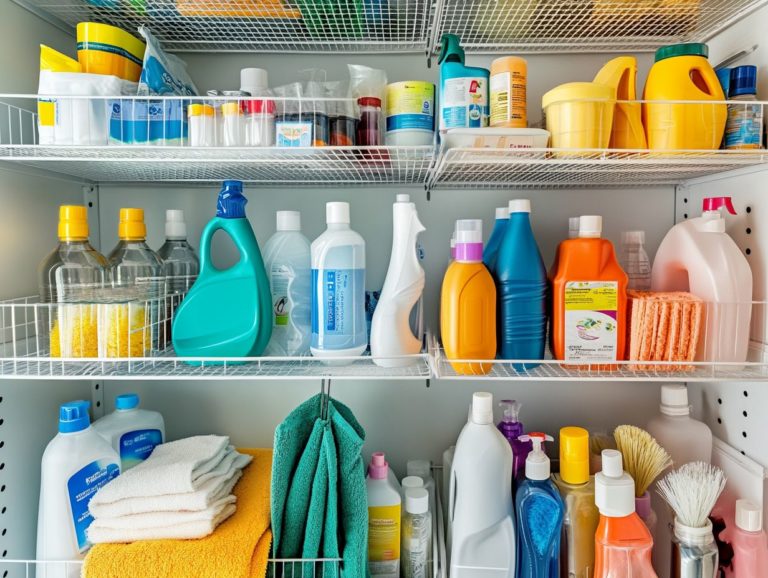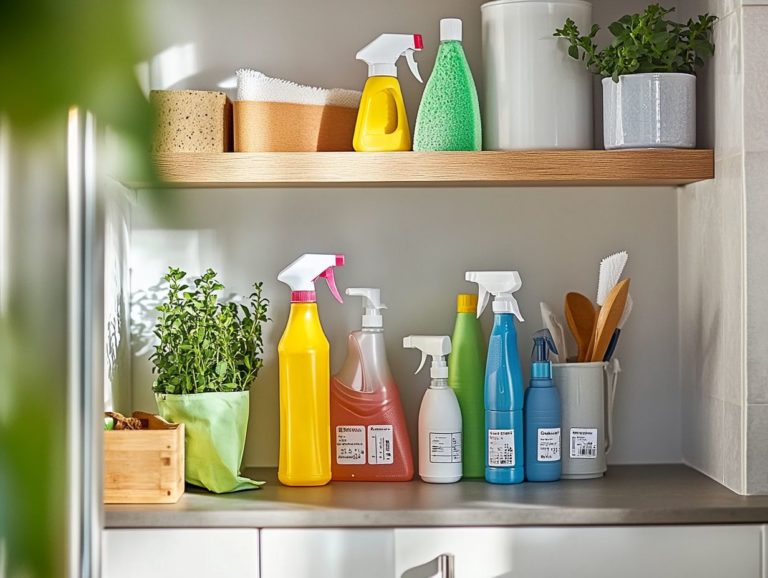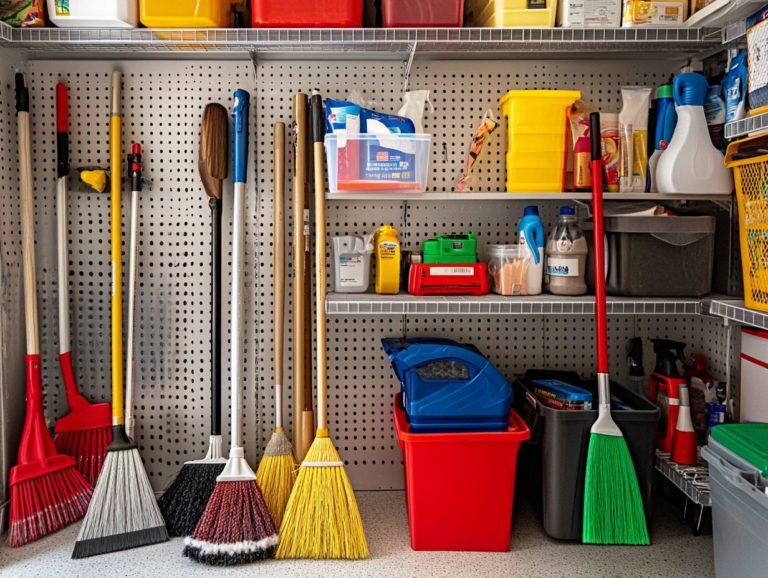The Consequences of Neglecting Storage Safety
Proper storage safety is essential for preserving the quality of your food and safeguarding your health and financial well-being. It also ensures compliance with safe storage laws.
Neglecting these critical storage practices can lead to serious consequences, such as spoiled food, foodborne illnesses, and financial losses, along with potential legal liabilities.
This exploration highlights the importance of proper storage protocols, the risks of ignoring safety measures, and practical strategies to enhance the security of your storage areas. This can help prevent unsecured guns from causing harm.
By taking simple actions, you can effectively protect your health, finances, and reputation, while also complying with various firearms regulations.
Contents
- Key Takeaways:
- Why is Proper Storage Safety Important?
- What are the Consequences of Neglecting Storage Safety?
- How to Ensure Proper Storage Safety?
- What are the Best Practices for Storage Safety?
- Frequently Asked Questions
- What are the consequences of neglecting storage safety, particularly in states like Florida and California?
- Why is it important to prioritize storage safety, including for concealed carry licenses holders?
- What are some common storage safety mistakes, including issues seen by the Orlando Police Department?
- How can neglecting storage safety impact a business, especially in states like Texas and New York?
- What are some ways to promote storage safety and prevent the firearm theft epidemic?
- What should I do if I notice unsafe storage practices in my workplace, especially in states like Massachusetts and Connecticut?
Key Takeaways:
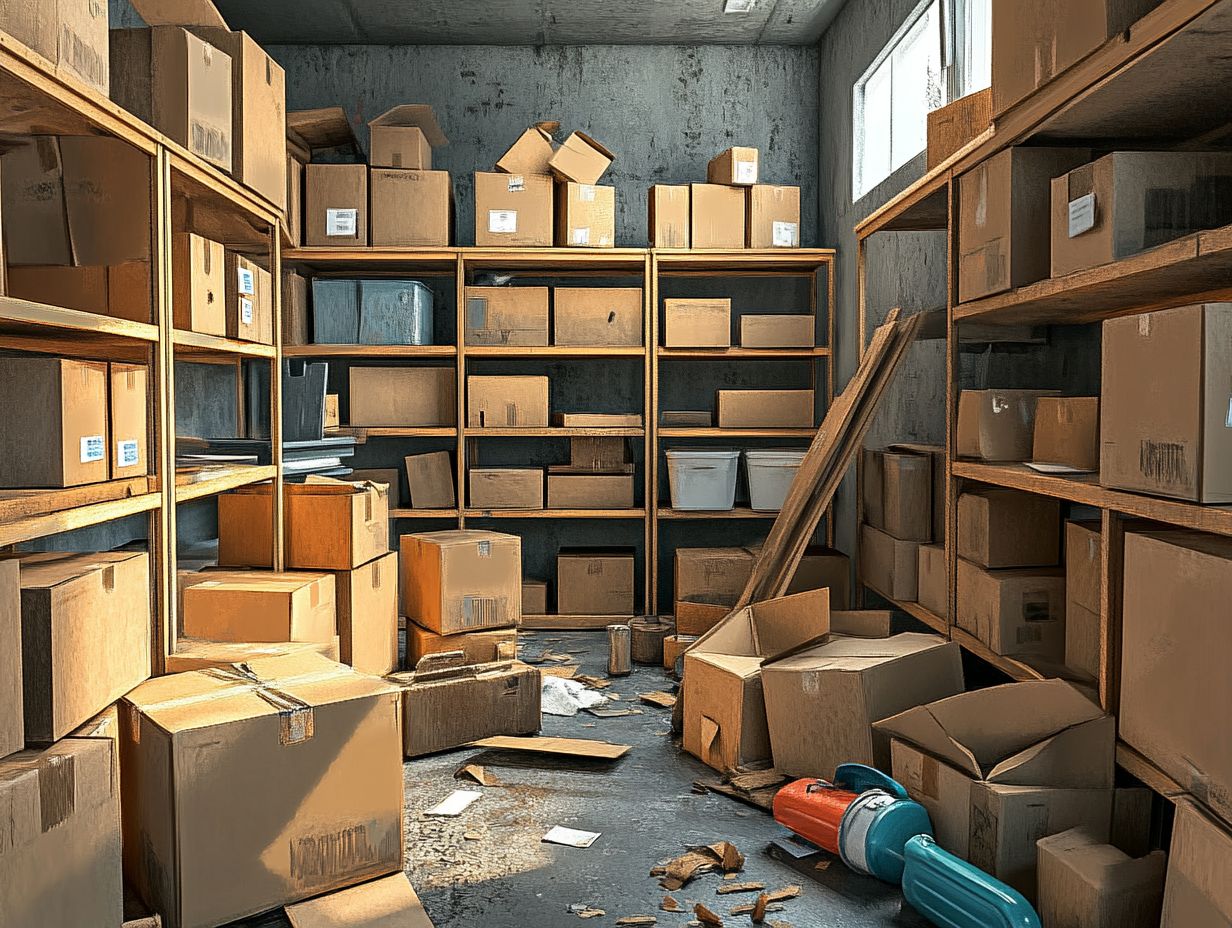
- Neglecting storage safety can lead to spoiled food, foodborne illnesses, financial loss, damage to reputation, gun-related injuries, and legal consequences.
- To ensure proper storage safety, follow guidelines, check expiration dates, keep areas clean and organized, use proper containers, and regularly inspect storage areas.
- Best practices include rotating stock, labeling items, storing food at appropriate temperatures, keeping chemicals separate, ensuring gun safety awareness, and training employees on safety procedures.
Why is Proper Storage Safety Important?
Proper storage safety is crucial for responsible gun ownership. It protects your firearms and enhances the safety of everyone around you, especially children and adolescents.
Implementing effective gun storage practices significantly reduces risks linked to unsecured firearms. These risks can lead to devastating consequences, including unintentional shootings, gun theft, and unauthorized access by minors.
As a firearm owner, you must understand the importance of complying with firearm storage laws and participating in firearms safety courses. This commitment promotes responsible gun ownership and is vital in preventing gun-related injuries, suicides, homicides, and fatalities.
What are the Consequences of Neglecting Storage Safety?
Neglecting storage safety impacts not just the firearm owner but the broader community as well. Careless storage can lead to increased firearm theft and firearm-related injuries, resulting in tragic fatalities.
When firearms are stored negligently or left unsecured, they become accessible to unauthorized individuals, including children and adolescents. This raises serious concerns about gun violence prevention and the legal liabilities that come with negligence. Consequences can include criminal charges and civil liabilities, emphasizing the importance of responsible gun storage practices.
1. Spoiled Food and Wastage
Spoiled food and waste stem from negligence in storage safety, particularly in food handling and preservation practices.
These issues highlight the need for careful attention to storage techniques. Just as improper food storage can result in health risks and environmental repercussions, failing to secure firearms safely poses serious dangers. Like expired food that can harbor bacteria, neglecting to store weapons properly can lead to accidental discharges or unauthorized access. This comparison underscores the essential nature of safety practices for both food and firearms.
Fostering vigilance and responsibility in these areas is crucial to prevent harmful outcomes.
Take action now to ensure proper storage safety for both food and firearms!
2. Foodborne Illnesses
Foodborne illnesses can strike hard as a result of inadequate storage practices, emphasizing the far-reaching consequences of disregarding safety protocols.
Neglecting these protocols not only threatens public health but also raises serious concerns in other critical areas, such as firearm safety. Just as improper food storage can lead to contamination and illness, failing to pay attention to safe firearm storage can create perilous situations, including accidental discharges or theft.
This connection between different safety realms highlights the necessity of adhering to established guidelines. Carelessness in any safety practice can trigger a domino effect, impacting various aspects of life, including potential criminal charges.
Ultimately, prioritizing safety whether in the kitchen or when handling firearms demonstrates a commitment to the well-being of everyone in your community.
3. Financial Loss
Neglecting proper storage practices can lead to significant financial loss, resulting in wasted resources and potential legal expenses stemming from liability issues, highlighting the importance of secure gun storage.
This is particularly critical in contexts like firearm handling and storage. If you, as a firearm owner, fail to secure your weapon properly, you risk theft or misuse, which can expose you to lawsuits and considerable financial repercussions. Beyond the immediate legal costs, you might find yourself facing higher insurance premiums or even fines from regulatory agencies. Should an incident occur involving an unsecured firearm, the aftermath could lead to expensive settlements or judgments, not to mention the potential loss of personal property and damage to your reputation.
These financial consequences emphasize the necessity of implementing diligent and responsible practices to protect your assets.
4. Damage to Reputation
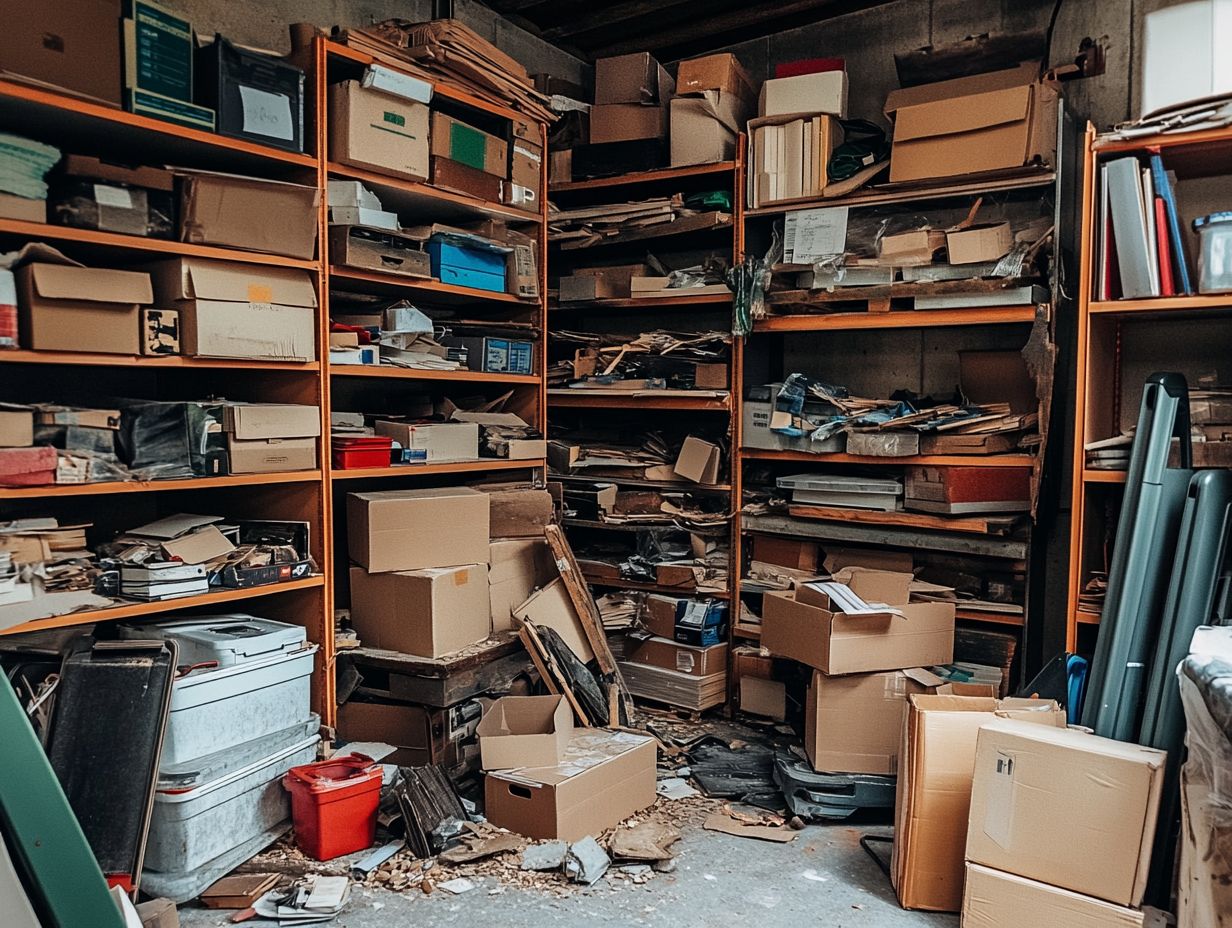
When you fail to adhere to safety standards in storage practices, the damage to your reputation can be significant, impacting trust and credibility in profound ways.
In various sectors, especially those dealing with potentially hazardous materials, the consequences of negligence can ripple far and wide. Take gun ownership, for example. If safety measures are lax, not only does it put individuals at risk, but it also undermines public confidence in responsible gun practices. The way you manage your weapons heavily influences the community’s perception, particularly in light of any incidents stemming from inadequate precautions.
Such oversights can create a narrative of irresponsibility, making it all the more difficult for law-abiding gun owners to earn the respect and trust they seek from their neighbors and local authorities, especially under the scrutiny of firearm legislation.
5. Legal Consequences
Neglecting proper storage safety poses significant legal risks, especially given the firearm legislation that mandates strict adherence to safe practices.
If you fail to comply with these laws, you may face various legal ramifications, including civil suits from individuals affected by gun misuse or theft due to negligent storage. In more severe cases, improper storage of a firearm that is later used in a crime could lead to criminal charges, which may result in fines or even imprisonment for you as the owner.
To mitigate these risks, it s essential to stay informed about local regulations, invest in secure storage solutions, and consider regular training on responsible gun ownership. By following established storage protocols, you not only protect others but also safeguard yourself legally, ensuring that you remain in compliance with the law.
How to Ensure Proper Storage Safety?
Ensuring proper storage safety is crucial for every firearm owner, and it starts with a clear understanding of the laws and regulations surrounding firearm storage that are designed to protect both individuals and communities.
By implementing secure gun storage practices, utilizing effective locking devices, and participating in firearms training, you can significantly mitigate the risks associated with unsecured firearms. Moreover, adhering to safe storage laws not only promotes responsible gun ownership but also elevates the overall safety of your household, particularly if there are children and adolescents present.
1. Follow Recommended Storage Guidelines
Following recommended storage guidelines is crucial for responsible gun ownership. Make sure you understand and comply with safe storage laws, which can vary significantly from state to state. Some jurisdictions have specific requirements regarding locking devices or storage methods.
Using gun locks, such as trigger locks or cable locks, can greatly diminish the risk of unauthorized access, especially in homes with children. Always keep your firearms unloaded when not in use and stored in a sturdy, locked cabinet or safe that meets both local and federal firearm regulations.
Being well-informed about these practices enhances your safety and contributes to a culture of responsibility within your community. Take action now!
2. Check Expiration Dates
Checking the expiration dates on your safety equipment is essential to ensure that all your storage measures remain effective and reliable. Regularly assess the condition of items like locks, gun safes, and fire extinguishers to significantly reduce the risk of accidents or malfunctions.
These routine checks help you identify wear and tear and ensure that all mechanisms are functioning correctly, ultimately enhancing your overall safety. Understanding the importance of maintaining your safety equipment fosters a more responsible attitude toward firearm ownership.
Stay proactive in these evaluations to promote a secure environment for both your firearms and their surroundings. This effectively minimizes potential hazards associated with negligent gun storage.
3. Keep Storage Areas Clean and Organized
Keeping your storage areas clean and organized is essential for the secure storage of firearms. Prioritizing cleanliness and organization enhances the overall safety and accessibility of the items you have on hand.
A clutter-free environment allows you to easily locate necessary accessories and ensures that the weapons themselves are stored securely, away from unauthorized access. This thoughtful arrangement significantly reduces the risk of accidents and fosters a culture of safety awareness.
Maintaining high standards in all areas of storage whether it s your kitchen pantry or your gun cabinet is crucial for safeguarding both personal and public well-being. Ensuring safely stored firearms can prevent unauthorized access and contribute to gun access prevention.
4. Use Proper Storage Containers
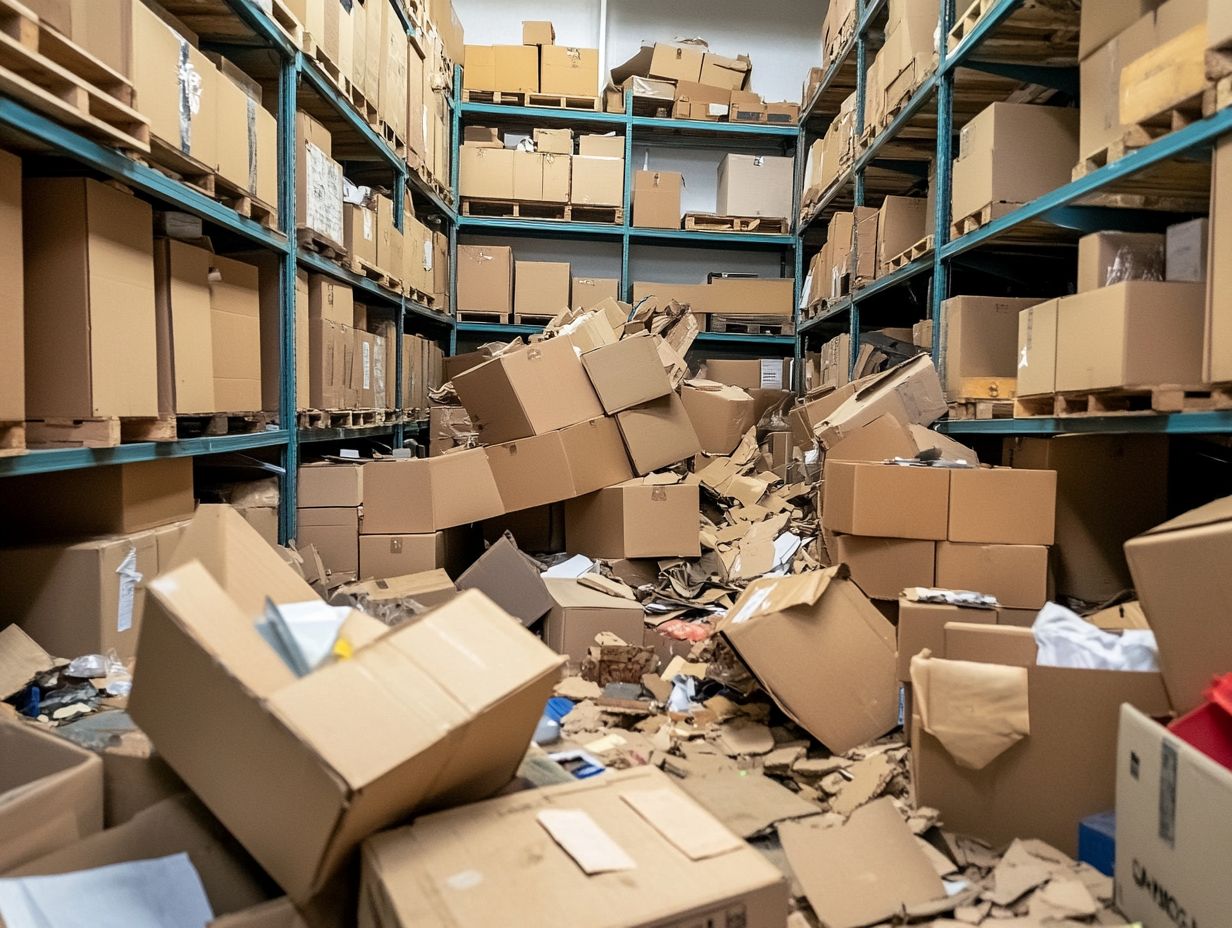
Using proper storage containers is vital for maintaining the integrity and safety of your stored items, whether they are food or firearms. The choice of storage containers can significantly impact your safety standards.
Secure gun cabinets and safes are essential solutions that ensure firearms remain inaccessible to unauthorized users, particularly children. This is important for adhering to child safety laws and preventing children access firearms.
Consider specialized options like lockable ammo boxes and portable cases that offer versatile containment solutions tailored to your various storage needs. By investing in high-quality storage containers, you foster a culture of safety that extends throughout your household and into the wider community.
Take charge of your firearm safety today for a secure tomorrow!
5. Regularly Inspect Storage Areas
Regular inspections of your storage areas, including checks on loaded weapons, are essential for maintaining safety standards. Ensure that every item, including firearms, is stored correctly.
Routine evaluations are crucial for identifying potential hazards that could create safety risks. For instance, in food storage, monitor for temperature fluctuations or contamination risks that could lead to spoilage or health issues. When it comes to firearms, consistent checks ensure compliance with safety regulations, preventing misfires or unauthorized access.
Make inspections a priority to protect your assets and contribute to the well-being of anyone who may come into contact with these items.
What are the Best Practices for Storage Safety?
Best practices for storage safety, especially regarding firearms, require a thorough approach that emphasizes secure gun storage, understanding Florida gun laws, and compliance with firearm legislation. Commit to firearm education and adopt effective gun storage safety measures, such as trigger discipline and gun locking devices, to play a vital role in preventing gun violence and safeguarding your household. This is particularly crucial for firearm suicide prevention.
These practices enhance your safety and contribute to accountability among gun owners, ultimately fostering safer communities for everyone. This approach is instrumental in mitigating firearm access risks.
1. Rotate Stock
Rotating stock is essential for guaranteeing that items are utilized within their recommended time frames. This principle extends beyond perishable goods in your kitchen; it also applies to firearms, where maintaining equipment in optimal condition is crucial for both performance and safety.
This is particularly relevant for concealed carry license holders who must ensure their firearms are always in top condition. In the culinary world, regularly checking expiration dates and prioritizing older items helps prevent waste and promote better health.
Similarly, cycle through your ammunition and routinely inspect your gear to avoid malfunctions and ensure you re always ready for action. This practice also helps maintain gun safety standards.
Proper rotation can significantly enhance safety measures and reduce risks in both contexts. This approach is critical for preventing negligent gun storage.
2. Label and Date Items
Labeling and dating your stored items, particularly food and safety equipment, is essential for maintaining organization and ensuring safety.
This practice becomes even more critical for responsible firearm storage. By clearly marking storage containers and their contents, you can quickly assess the condition and age of your items, significantly reducing the risk of accidents or misuse.
Properly labeled firearm storage not only serves as a safeguard but also ensures that everyone nearby is aware of potential hazards. This can prevent liability for negligence.
When you adopt systematic labeling, you foster a culture of safety and accountability, allowing you to access what you need efficiently while simultaneously protecting others from unforeseen dangers. This practice is crucial for promoting gun owner accountability.
3. Store Food at Appropriate Temperatures
Storing food at the right temperatures is crucial for preventing spoilage and ensuring safety. Keeping perishables within the recommended temperature range significantly reduces the growth of harmful bacteria, leading to a safer dining experience.
Just as temperature control is vital for maintaining the effectiveness and safety of firearms, optimal storage conditions are essential for food preservation. Recognize these parallels; both food safety and responsible firearm ownership revolve around protecting yourself and others through diligent practices.
Consistently monitoring and adjusting temperatures can make a remarkable difference in achieving longevity and safety in both areas.
4. Keep Chemicals and Cleaning Products Separate
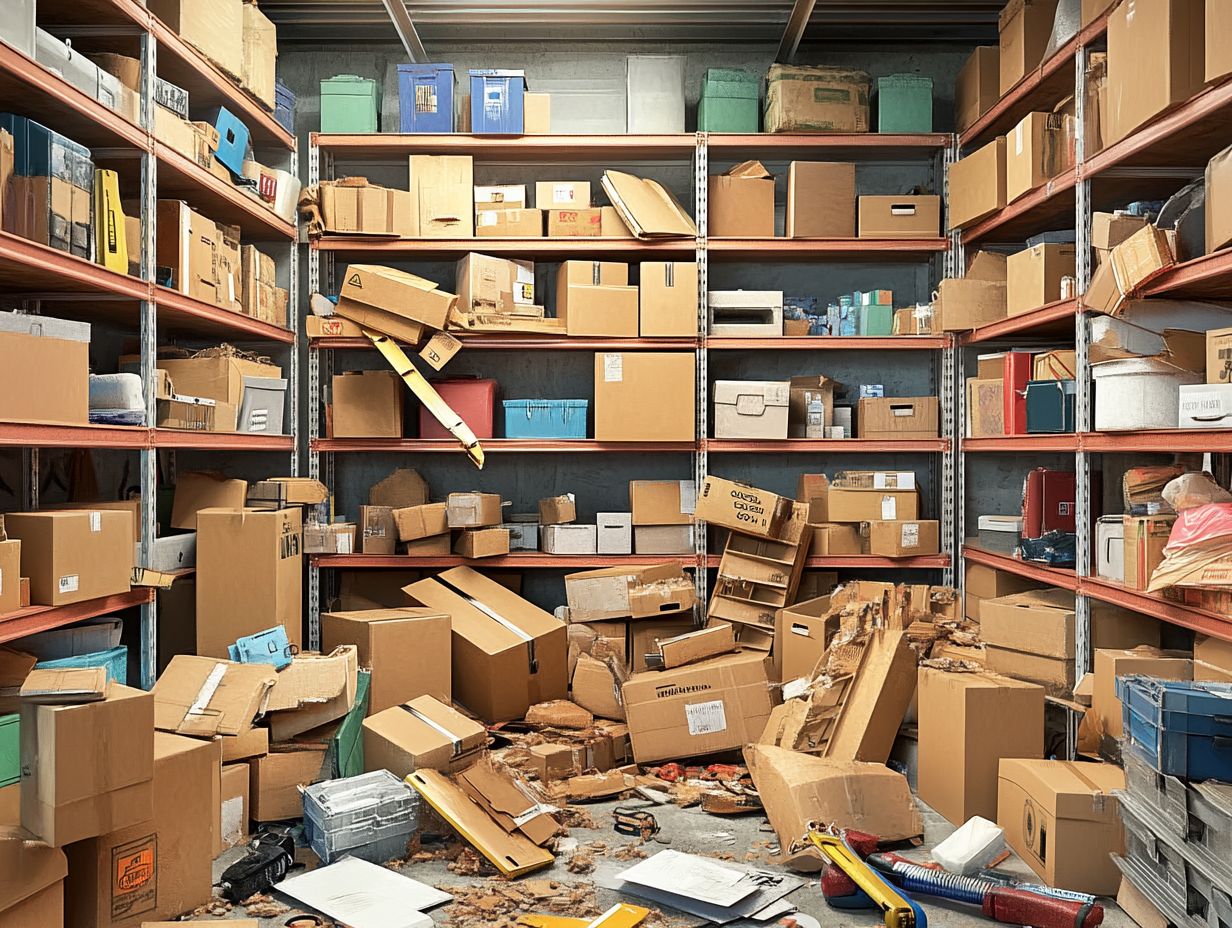
Keeping chemicals and cleaning products distinctly separated from food and safety equipment is essential to prevent contamination and avoid accidents.
This is especially important for gun safety. Proper storage practices can separate secure handling from potential mishaps. By ensuring adequate separation, you protect food items from harmful substances. You also guarantee that firearms and ammunition remain securely stored away from careless access. This is crucial for adhering to child access prevention laws.
Maintaining organized storage systems that prioritize safety significantly reduces the risk of accidental discharges or unsafe use of firearms. Dedicated compartments for firearms, ammunition, and hazardous materials act as reminders of the importance of responsible management in safeguarding your safety and the well-being of others.
5. Train Employees on Storage Safety Procedures
Training employees on storage safety procedures, particularly in firearm education and gun safety awareness, is crucial for cultivating a safe environment. This training includes understanding local laws, such as Florida gun laws, gun access prevention measures, and the importance of securing loaded weapons.
By equipping yourself and your colleagues with the knowledge and skills necessary to handle firearms responsibly, you foster a culture of safety that transcends the workplace. This comprehensive training builds confidence and empowers employees to prevent accidents!
Ultimately, informed practices lead to increased vigilance and a shared sense of responsibility. This paves the way for safer homes and neighborhoods where firearms are stored securely and responsibly. This approach addresses the broader issues of gun violence statistics and the underground market for firearms.
Frequently Asked Questions
What are the consequences of neglecting storage safety, particularly in states like Florida and California?
Neglecting storage safety can result in various negative consequences such as property damage, injuries, and even fatalities.
Why is it important to prioritize storage safety, including for concealed carry licenses holders?
Prioritizing storage safety is crucial because it helps prevent accidents, protects valuable possessions, and ensures the well-being of individuals.
What are some common storage safety mistakes, including issues seen by the Orlando Police Department?
Some common storage safety mistakes include overloading shelves, storing hazardous materials improperly, and not securing heavy items.
How can neglecting storage safety impact a business, especially in states like Texas and New York?
Neglecting storage safety can lead to costly damages, loss of inventory, and potential legal issues for a business.
What are some ways to promote storage safety and prevent the firearm theft epidemic?
Ways to promote storage safety include proper labeling, regular maintenance and inspection of storage units, and providing training for employees.
What should I do if I notice unsafe storage practices in my workplace, especially in states like Massachusetts and Connecticut?
If you notice unsafe storage practices in your workplace, report them to a supervisor immediately to prevent any potential accidents or hazards.

